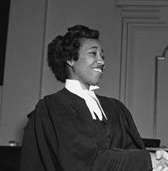Violet King Henry
Violet Pauline King Henry (October 18, 1929 – March 30, 1982)[1] was the first black woman lawyer in Canada, the first black person to graduate law in Alberta and the first black person to be admitted to the Alberta Bar. She was also the first woman named to a senior management position with the American national YMCA.[2][3]
Violet King Henry | |
|---|---|
 | |
| Born | Violet Pauline King October 18, 1929 Calgary, Alberta, Canada |
| Died | March 30, 1982 (aged 52) New York, New York, United States |
| Nationality | Canadian |
| Occupation | Lawyer |
| Known for | First Black Canadian woman lawyer |
Early life
King studied at Crescent Heights High School, where she was president of the Girls Association in grade 12 and had her yearbook captioned with her unusual intention to study criminal law.[1] She started at the University of Alberta in 1948, joining the feminist Blue Stocking Club (modelled after the Blue Stockings Society), serving as Vice-President of the Students Union and the representative of the Students’ Union to the National Federation of Canadian University Students.[1] She became class historian for her final year and was the Alberta representative to the International Student Services Conference in Hamilton in 1952.[1] To finance her studies, she taught piano.[1] An active student, King was one of just four students to receive an Executive "A" gold ring at Color Night, the university's annual celebration of student contributions to the university – the other three students were future premier Peter Lougheed, Ivan Head (future advisor to Pierre Trudeau), and lawyer Garth Fryett.[1]
Legal studies
When King started her law degree, there were just three women in a class of 142.[1] King graduated with her law degree at the University of Alberta in 1953 and was admitted to the Alberta bar in 1954. At the time, these accomplishments were reported prominently by newspapers, including The Calgary Herald, The Albertan, and The Edmonton Journal.[4]
Ties to African-American settlement in Alberta
Her father, John King, and his extended family moved to Amber Valley, Alberta[5] in 1911, as part of a group of African American farmers migrating from Oklahoma to Alberta, both as part of the Great Migration and to avoid racist laws. They settled in Keystone, Alberta (now Breton, Alberta) southwest of Edmonton. They came to Canada as part of a Canadian government campaign to entice Southern US farmers to the Canadian Prairies, although Clifford Sifton's plan had expected white settlers.[6][7]
King's parents, John and Stella King, moved to Calgary in 1919, where her father worked as a porter and her mother worked as a seamstress.[4] Many African Americans, including her father, worked as porters in Canada. Both of her parents were considered important members of the Calgary community of black persons.[2][3] When she graduated, the Brotherhood of Sleeping Car Porters, a key player in the US Civil Rights movement, gave significant attention to her achievements and both the union's president and vice president travelled from New York and Detroit to make a presentation to her in Calgary.[4]
Career
King practiced criminal law in Calgary, articling with E.J. McCormick.[8] She later moved to Ottawa, around 1956, to join the federal civil service in a senior administrative role at Citizenship and Immigration Canada, where she was promoted twice.[4] She served during the time that Ellen Fairclough was named Canada's first woman member of cabinet and Minister of Immigration. By 1962, the Department had taken major steps to eliminate racism and respect the new Bill of Rights.[9]
In 1963, King moved to the United States, working in executive roles for the YW/YMCA in Newark, New Jersey and Chicago, Illinois, gaining prominence for helping African Americans find work.[10][11][4] In 1976, she was appointed Executive Director of the national Council of YMCA’s Organizational Development Group, becoming the first woman named to a senior management position with the American national YMCA.[4][2][3]
In 1965 King married Godfrey C. Henry, a Trinidadian-American and graduate of Columbia University's Graduate School of Political Science, and they lived in Newark, NJ. In 1966 King-Henry gave birth to her only child, daughter Jo-Anne Henry.[12]
King was 52 when she died of cancer in New York City in 1982.[11]
She was featured in the documentary, Secret Alberta: The Former Life of Amber Valley by filmmaker Cheryl Foggo in 2017; King was a bridesmaid at Foggo's mother's wedding.[2][3]
References
- Thompson, Katherine. "Featured Centenary 'Firsts' Story: Violet King (U of A Law 1953)". University of Alberta. University of Alberta. Retrieved 4 February 2017.
- "Milestones in the History of African Americans and the YMCA". University of Minnesota. University of Minnesota. Retrieved 4 February 2017.
- Bell, David. "Hidden history explored in new doc as Alberta celebrates Black History Month". CBC. CBC. Retrieved 4 February 2017.
- "Violet King". University of Alberta. University of Alberta. Retrieved 4 February 2017.
- "Alberta black settlement subject of new doc". CBC Calgary. 1 February 2017. Retrieved 4 February 2017.
- "Violet King". University of Alberta. University of Alberta. Retrieved 2 February 2017.
- Greene, Gael. "The Quest for Land and Freedom on Canada's Western Prairies: Black Oklahomans in Alberta and Saskatchewan, 1905–1912". BlackPast.org. BlackPast.org. Retrieved 2 February 2017.
- De Lorme, Jack (3 June 1954). "Violet King, lawyer, Calgary, Alberta". The Albertan: 1. Retrieved 4 February 2017.
- "Immigration Regulations, Order-in-Council PC 1962–86, 1962". Canadian Museum of Immigration at Pier 21. Canadian Museum of Immigration at Pier 21. Retrieved 5 February 2017.
- "Did You Know Who was the First Black Female Lawyer in Canada?". Women’s Legal Mentorship Program. Women’s Legal Mentorship Program. Retrieved 4 February 2017.
- "February is Black History Month – 2016". The University of British Columbia. The University of British Columbia. Retrieved 4 February 2017.
- Daughter Jo-Anne Henry